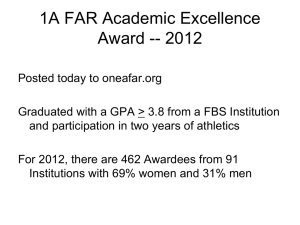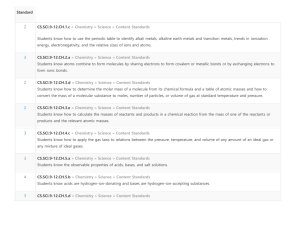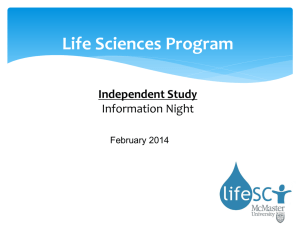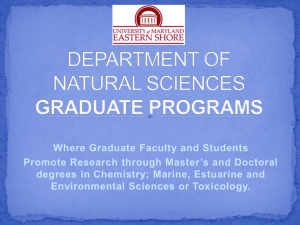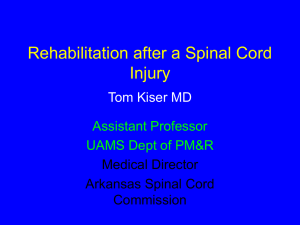University of Durham Open Day Natural Sciences Dave Robson Sub
advertisement
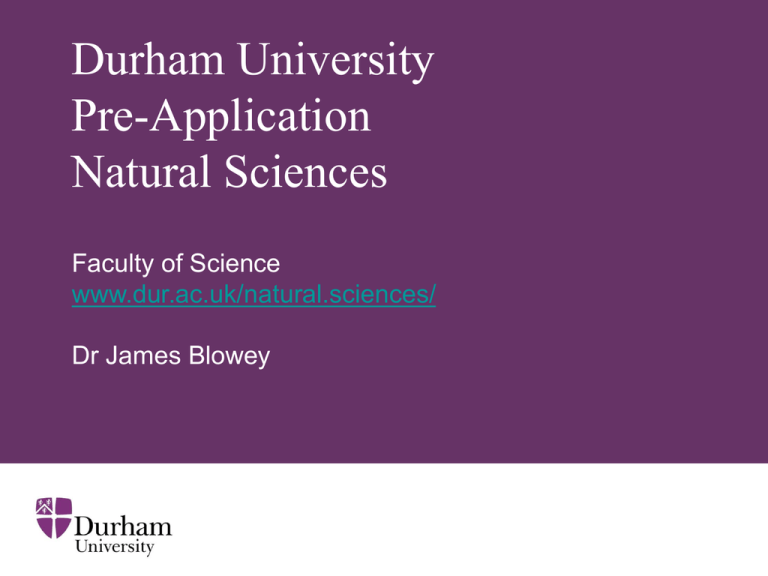
Durham University Pre-Application Natural Sciences Faculty of Science www.dur.ac.uk/natural.sciences/ Dr James Blowey Natural Sciences ∂ Natural Sciences: overview Talk focuses on the key features of the structure of the Natural Sciences degree programme: ∂ Flexibility; Choice; Depth. Natural Sciences has been in existence for nearly 40 years and before (in another name) Natural Sciences: structure Degree structure for 2014 entrants • 3 year (B.Sc.) or 4 year (M.Sci.) degree • 120 credits (~6 modules) a year ∂ • Each module lasts all year • At least 50% of your modules over the three or four years must be from the Faculty of Science Natural Sciences: depth • Study the same key modules as single honours students to give progression in those subjects. ∂ Study more than one subject to a high level. For details of content, see other talks today or go to www.dur.ac.uk/natural.sciences/ Natural Sciences: flexibility within Year of Number of Number of credits study subjects studied at studied Maximum number of credits studied in a single subject 2≤ Level I = 120 Year 1 ≤ 4 80 2 2≤ 90 ≤ Level II ≤ 120 Year 2 ≤ 3 0 ≤ Level I ≤ 30 80 3 2≤ BSc (100); MSci (80) 1 ∂ Year 3 ≤ 3 4 90 ≤ Level III ≤ 120 0 ≤ Level II ≤ 30 1≤ Level IV = 120 Year 4 ≤ 3 120 Natural Sciences: choice Typical pathways • Major in one subject and EITHER take new subjects in your second year OR take the same three subjects in each year (a B.Sc. or M.Sci. in Natural Sciences) • Take the same two subjects ∂ in each of the years (JointHonours) – almost all Science Joint-Honours degrees operate within Natural Sciences • Possibility of transfer to a single honours degree • Possibility of transfer between BSc and MSci up a good way through the third-year. Natural Sciences: degrees M.Sci. in Natural Sciences Available only in the following subjects: Earth Sciences, Chemistry, Computer Science, Maths, Physics ∂ and Biology (but only with Chemistry and Physics) B.Sc. in Natural Sciences Available in all the contributing subjects, with at least 50% of study from the Faculty of Science Natural Sciences: subjects 1 Subjects within the Faculty of Science (Group 1): • • • • • • • Biology Chemistry ∂ Computer Science Earth Sciences Mathematics Physics Psychology Natural Sciences: subjects 2 Subjects which make a Joint-Honours contribution to the programme (Group 2): • • • • • • Anthropology Archaeology Business Economics Geography Philosophy ∂ Natural Sciences: subjects 3 Selection of other subjects which contribute to the programme (Group 3): • • • • • • • Languages Theology ∂ Sociology Classics English History plus more but not Engineering or Law. Natural Sciences: Joint-Honours The Joint Honours degrees: • B.Sc. Honours in A∂ AND B within the Natural Sciences programme • M.Sci. Honours in A AND B within the Natural Sciences programme MSci/BSc Joint-Honours degrees 2013 entry ∂ 13 An- Anthropology Ar - Archaeology Bi - Biology Bs - Business Ch - Chemistry CS - Computer Science ES - Earth Sciences Ec - Economics Gg - Geography Ma – Mathematics Ph - Philosophy Py - Physics Ps- Psychology Natural Sciences: 2013 entry An Ar An Bi Bs Ch CS Ec Gg Ph Py Ps * * * * Bs * * * * * * * * * * Ch * CS * * ES * * * ∂ * Ec Gg * Ma * * * * * * * * * * * * Ph * * Py Ps Ma * Ar Bi ES * * * * * * * * * * * * * B.Sc Joint Honours Combinations for 2013 entry Natural Sciences M.Sci. Joint Honours degrees within Natural Sciences: M.Sci. in Biology and Chemistry ∂ M.Sci. in Biology and Physics M.Sci. in Chemistry and Mathematics M.Sci. in Chemistry and Physics M.Sci. in Mathematics and Physics Natural Sciences: depth • All students BSc/MSci must undertake final-year capstone/dissertation research-led work ∂ – Into Schools; – Dissertation; – Project; Natural Sciences: year abroad • Possibility of a year abroad year abroad in a university scheme run by the International Office,∂ see Section 7 of the Handbook. Natural Sciences: cautions •Choices of modules are restricted by the University timetable; sometimes by capacity; sometimes they are tied to degree programmes. •Choices need to leave a programme of study ∂ open •Chemistry has a limited number of bench spaces •Mathematics with progression to other Maths beyond Level 2 need and AS-level in Further Maths. Natural Sciences: facts • 1045 applicants for 2013 entry and 50 applicants for 2014 entry. • 600 offers for 206 places. • Standard offer: A*AA ∂ • Restriction on numbers of offers to study Chemistry within Natural Sciences 100 bench spaces 300 offers. • Accreditation on certain tightly defined routes in Chemistry, Earth Sciences, Physics and Psychology Natural Sciences: any questions ∂ www.dur.ac.uk/natural.sciences/

